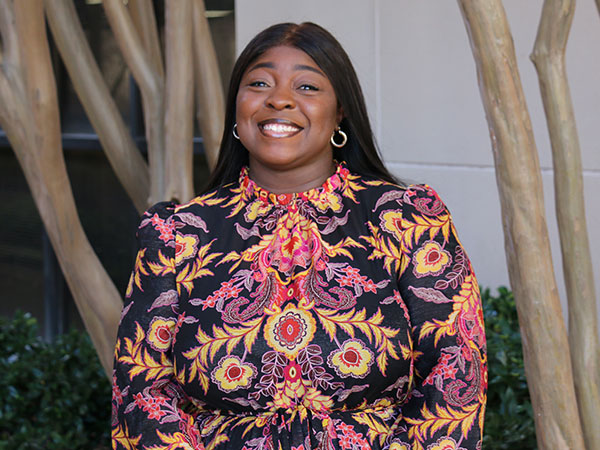Q: What universities have you attended, degrees earned, and graduation years?
Undergraduate: Babcock University, Nigeria: BSc. Public Health, 2017 and MPH in Epidemiology from UAB, 2021.
Q: Which program within the Department of Epidemiology are you currently enrolled?
PhD in Epidemiology, anticipated graduation in December 2025.

Q: Tell me about yourself (where you grew up, how you got into public health, how you ended up at UAB, etc.)
I was born and raised in Abuja, Nigeria, and my passion for public health began by watching my father, a doctor and public health consultant, work in Nigeria. After obtaining my first degree in public health, I realized the need to further enhance my skills and deepen my knowledge in a field that greatly interested me—epidemiology. This exposure fueled my curiosity about population health, disease outcomes, and the distribution of diseases. As I delved deeper into these areas, I became particularly drawn to the research at UAB, especially the REasons for Geographic and Racial Differences in Stroke (REGARDS) study. This inspired me to pursue a master’s in public health at UAB, where I could follow my passion and contribute to impactful public health research. I also decided to pursue a PhD in Epidemiology to deepen my understanding of disease patterns and develop effective interventions for improving population health.
Q: Why did you choose to study Epidemiology? And why at UAB?
I have always been interested in disease outcomes and their distribution across different populations. I'm also fascinated by various study designs and methodologies, particularly how they are applied in diverse research contexts, which drove my desire to learn more. UAB’s program has been an excellent fit for me, as it has provided opportunities to apply what I've learned through numerous collaborative projects and mentoring experiences. I have had the privilege of collaborating with and learning from investigators, policymakers, researchers, clinicians, and community members. The program is well-grounded in essential public health competencies and has equipped me with the skills necessary for meaningful contributions to the field.
Q: Is there a faculty member who has made an impact on your academic journey during this program?
Yes, Dr. Emily B. Levitan and Dr. Thomas W. Buford have been instrumental to my learning and growth as a student at UAB. Their mentorship and expertise have profoundly shaped my understanding of public health and aging, motivating me to push beyond my comfort zone and explore new areas of research. My academic journey has been greatly enriched by their guidance, both in the classroom and through their availability for in-depth discussions outside of it. Their support has empowered me to approach challenges with confidence and develop a deeper passion for my field of study. Additionally, they have supported me in pursuing multiple opportunities, which have significantly contributed to my career development and professional growth.
Q: Have you been involved in any interesting projects or organizations during your time here?
Yes, a significant number of projects actually. I have been involved in clinical trials, pilot studies, qualitative research, and quantitative studies. I have also published multiple papers and presented my science in local and national meetings in my field. My research focuses on cardiovascular diseases, aging, and recovery, particularly among under-resourced and vulnerable populations. I've had the opportunity to work on many fascinating projects, and use large datasets like Medicare administrative claims data, the REasons for Geographic and Racial Differences in Stroke (REGARDS)-MI study, and the Center for AIDS Research (CFAR) Network of Integrated Clinical Systems (CNICS), as well as clinical trials such as the ACE Inhibitors Combined with Exercise for Seniors with Hypertension (ACES) trial. These experiences have greatly enhanced my skills and expertise in Aging, data analysis, study design, and understanding health disparities.
Q: What’s been your favorite class in the School of Public Health and why?
I really enjoyed many of the classes I took during my time here. One standout was the course “Analysis of Follow-Up Studies” which significantly enhanced my understanding of various epidemiological principles and methods. Additionally, the School of Public Health offers a grant writing class for PhD students that I found particularly valuable. It helped me apply many of the concepts I had learned, allowing me to practice essential skills in a real-world context. Following that class, I successfully submitted a predoctoral fellowship application to the American Heart Association and was awarded the fellowship!